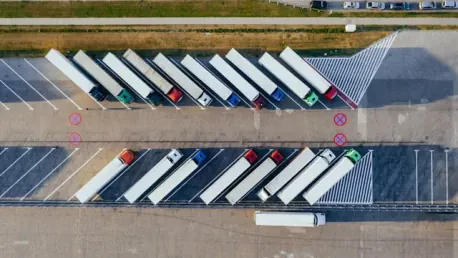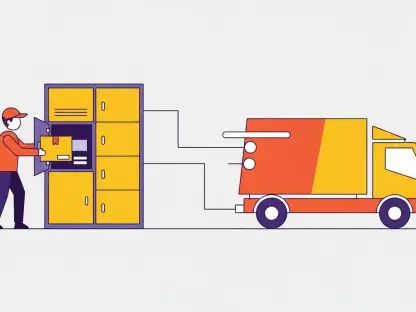The Warehouse & Logistics Coordinator at Scanlan Theodore Americas in Brooklyn, New York, is a cornerstone of the company’s operational efficiency and effectiveness. This pivotal role, with a generous salary of up to $100,000 per annum and inclusive of benefits and paid time off (PTO), ensures the streamlined function of warehouse activities, logistics, and supply chain management. The coordinator’s influence spans across multiple dimensions of the company, from day-to-day operations to strategic planning and leadership.
Enhancing Operational Efficiency
Daily Operations Management
The primary responsibility of the Warehouse & Logistics Coordinator is to assist the Warehouse and Logistics Manager in managing the warehouse’s daily operations. This crucial role encompasses overseeing order fulfillment processes, ensuring accurate inventory management, and coordinating transportation logistics. The smooth execution of these tasks is essential to guarantee timely deliveries to stores and precise stock processing. By ensuring that all elements of the warehouse run seamlessly, the coordinator significantly contributes to the overall efficiency and reliability of the supply chain.
A typical day in the life of a Warehouse & Logistics Coordinator at Scanlan Theodore Americas might involve monitoring inbound and outbound shipments, addressing any discrepancies in stock levels, and liaising with various departments to ensure that all logistical needs are met. The coordinator not only ensures that orders are fulfilled accurately and on time but also helps maintain the reputation of the company for reliability and efficiency. This attention to detail and commitment to excellence in daily operations are foundational to the role’s success.
Strategy Development and Implementation
To optimize workflows and reduce operational costs, the coordinator is tasked with developing and implementing effective strategies that drive long-term success. This involves creating streamlined processes for inventory handling, improving transportation efficiency, and enhancing overall productivity within the warehouse. A well-planned strategy leads to significant improvements in the speed and accuracy of logistics activities, directly contributing to the bottom line.
Developing these strategies often involves analyzing current workflows, identifying areas that need improvement, and implementing new processes that are both efficient and cost-effective. The coordinator might work closely with other members of the management team to brainstorm and implement innovative solutions that can help the warehouse meet its goals. By continually refining these strategies, the Warehouse & Logistics Coordinator ensures that the warehouse operates at peak efficiency, reducing costs and increasing profitability over time.
Culture of Safety and Continuous Improvement
A significant aspect of the coordinator’s role is fostering a culture centered around safety and continuous improvement. By leading by example, the coordinator emphasizes the importance of a safe working environment and encourages ongoing enhancements in operational procedures. This focus ensures that the warehouse not only meets but exceeds industry standards, contributing to a positive and productive workplace.
A commitment to safety is demonstrated through regular training sessions, rigorous adherence to safety protocols, and proactive measures to prevent accidents and injuries. The coordinator champions a culture of continuous improvement by regularly soliciting feedback from team members and implementing changes that enhance both safety and efficiency. This approach not only improves day-to-day operations but also fosters a collaborative and engaged workforce that is dedicated to achieving the highest standards of performance.
Leadership and People Management
Mentoring and Upskilling Team Members
Leadership is a core component of the Warehouse & Logistics Coordinator’s role, entailing the responsibility of mentoring, upskilling, and fostering the professional development of warehouse team members. This involves providing guidance, setting performance goals, and encouraging a collaborative and productive work environment. By investing in the growth and development of their team, the coordinator ensures that the warehouse operates efficiently and effectively.
The process of mentoring and upskilling might include regular one-on-one meetings with team members, developing individualized training plans, and providing opportunities for professional growth. This not only enhances the skills and capabilities of the team but also boosts morale and job satisfaction. The Warehouse & Logistics Coordinator plays a vital role in creating a positive and supportive work environment where team members feel valued and empowered to contribute to the success of the company.
Supervisory Role in Manager’s Absence
In the absence of the Warehouse & Logistics Manager, the coordinator steps into a supervisory role, which involves managing team performance, ensuring the seamless operation of the warehouse, and addressing any issues that may arise. Effective people management skills are crucial to maintaining the efficiency and morale of the team during such times. The coordinator’s ability to lead and inspire the team is essential to maintaining high standards of performance and productivity.
Stepping into this supervisory role requires the coordinator to have a deep understanding of all aspects of warehouse operations, as well as the ability to make quick and informed decisions. By providing clear direction and support to team members, the coordinator ensures that operations continue to run smoothly and that any challenges are promptly addressed. This leadership capability is a testament to the coordinator’s versatility and commitment to the success of the warehouse.
Communication and Negotiation
The coordinator must also demonstrate strong communication and negotiation skills. These skills are essential when liaising with local suppliers, freight forwarders, and external parties to ensure the smooth coordination of deliveries and compliance with shipping requirements. Effective communication aids in resolving issues promptly and maintaining positive relationships with all stakeholders, which is crucial for the efficient functioning of the warehouse.
Effective negotiation involves finding mutually beneficial solutions to logistical challenges and building long-term partnerships with key suppliers and partners. By establishing open lines of communication and fostering collaborative relationships, the coordinator can effectively manage the complexities of logistics and supply chain management. These skills not only contribute to the smooth operation of the warehouse but also enhance the company’s overall reputation for professionalism and reliability.
Logistics and Inventory Management
Coordinating Store Allocation and Replenishment
A critical aspect of logistics management is coordinating store allocation and replenishment processes. This includes the precise picking, packing, and scanning of stock for stores across Australia (AUS) and the United States (US). The coordinator plays a vital role in creating packing lists and commercial invoices for both local and international shipments. By ensuring that stock is accurately allocated and replenished, the coordinator helps maintain optimal inventory levels and meet customer demands.
The process of coordinating store allocation and replenishment involves close collaboration with various departments, meticulous attention to detail, and a strong understanding of inventory management principles. By leveraging technology and implementing best practices, the coordinator ensures that the right products are delivered to the right stores at the right time. This not only enhances customer satisfaction but also contributes to the overall efficiency and profitability of the warehouse.
Managing US Operations and Freight
For US-based operations, the coordinator is responsible for calculating pricing for US invoices and organizing freight deliveries. This extends to handling shipments directly from suppliers to the US, ensuring compliance with local regulations and optimizing efficiency. Collaboration with department heads is essential for planning strategic stock storage and supporting various logistical projects, ensuring that all aspects of the supply chain are effectively managed.
Effective management of US operations and freight involves regular communication with suppliers and freight forwarders, meticulous attention to detail, and a proactive approach to problem-solving. By ensuring that all shipments are accurately priced, documented, and delivered on time, the coordinator plays a key role in maintaining the smooth operation of the warehouse. This level of oversight and coordination is crucial for optimizing the supply chain and achieving the company’s operational goals.
Proactive Warehouse Maintenance
Maintaining an organized and efficient warehouse layout is an ongoing responsibility that requires regular stocktake processes to be led and managed effectively. The coordinator ensures that received stock is accurately picked and prepped for processing, maintaining a systematic approach to warehouse management. This systematic approach helps sustain operational efficiency and accuracy, ensuring that all aspects of the warehouse run smoothly.
A proactive approach to warehouse maintenance involves regularly reviewing and optimizing the layout, implementing best practices for inventory management, and addressing any issues that may arise. By maintaining a clean, organized, and efficient warehouse, the coordinator helps minimize disruptions and maximize productivity. This attention to detail and commitment to excellence in warehouse management is essential for achieving the company’s operational and strategic objectives.
Data Management and Reporting
Managing Freight and Duty Costs
Accurate data management is crucial for effective logistics coordination. The coordinator is responsible for managing and distributing data on freight and duty costs, ensuring all shipments via DHL Express or other couriers are approved, tracked, and properly recorded. This process ensures comprehensive oversight and control over shipping expenses, allowing the company to make informed decisions about logistics and supply chain management.
The process of managing freight and duty costs involves regular data analysis, meticulous record-keeping, and a strong understanding of logistics principles. By ensuring that all shipments are accurately tracked and recorded, the coordinator provides valuable insights into shipping expenses and helps identify opportunities for cost savings. This data-driven approach is essential for optimizing the supply chain and achieving the company’s financial goals.
Reporting and Collaboration
Regular reporting and data analysis are integral to the coordinator’s role. By collaborating with department heads on strategic projects and preparing detailed reports, the coordinator provides crucial insights for informed decision-making. This data-driven approach supports the broader business needs and contributes to achieving organizational objectives, ensuring that the warehouse operates efficiently and effectively.
Effective reporting involves collecting and analyzing data on key performance indicators, identifying trends and opportunities for improvement, and presenting findings to senior management. By providing accurate and timely information, the coordinator helps ensure that the company can make informed decisions about logistics and supply chain management. This collaborative approach is essential for achieving the company’s strategic objectives and maintaining a competitive edge in the industry.
Adherence to Policies and Procedures
Ensuring Compliance
A key responsibility of the Warehouse & Logistics Coordinator is ensuring compliance with company policies and procedures. This involves adhering to established guidelines for warehouse operations, safety protocols, and logistical processes. The coordinator’s attention to detail and proactive approach ensures that all activities align with the company’s standards, contributing to a safe and efficient working environment.
Ensuring compliance involves regular audits, thorough documentation, and ongoing training for team members. By maintaining high standards of compliance, the coordinator helps mitigate risks and ensure that the warehouse operates smoothly and efficiently. This commitment to excellence in compliance is essential for upholding the company’s reputation and achieving long-term success.
Additional Responsibilities
The Warehouse & Logistics Coordinator at Scanlan Theodore Americas in Brooklyn, New York, is integral to the company’s operational success. Offering a competitive salary of up to $100,000 annually, along with benefits and paid time off (PTO), this role is crucial in maintaining seamless warehouse, logistics, and supply chain operations. The coordinator’s duties extend beyond daily tasks to include strategic planning and leadership, making this position critical to the firm’s efficacy and progress. The coordinator plays an essential role in various facets of the company, ensuring that every function, from inventory management to distribution, runs smoothly. By overseeing these areas, the coordinator not only contributes to the efficiency of day-to-day operations but also supports the long-term strategic goals of Scanlan Theodore Americas. This role demands a high level of organization, attention to detail, and the ability to manage multiple priorities simultaneously, ensuring that the company’s logistics and warehouse activities align with overall business objectives and drive operational growth.









